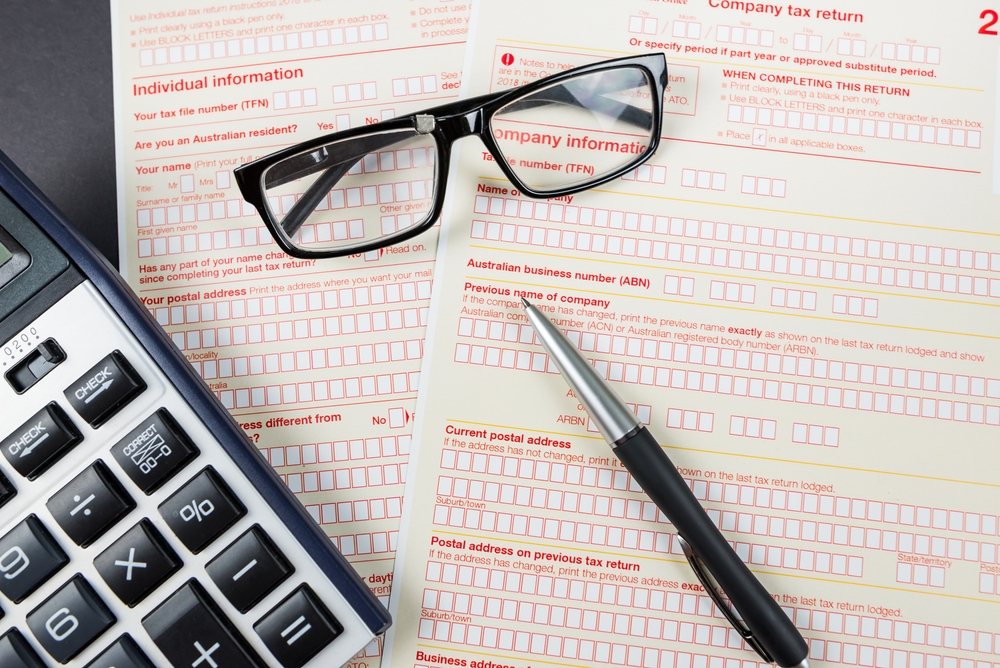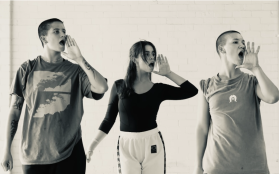Simply, yuck! I don’t think anyone likes doing tax. And for many creatives and artists, it is a foreign headspace – they may as well be looking at a manual for the next NASA launch.
So how, then, can you be sure to get the most out of your tax return?
To help, we have collated a quick checklist of things ‘not to forget to claim’, to help you through the quagmire of elusive dollars and bountiful bureaucracy.
And while a no-brainer, a reminder that you can’t double dip on these things – that is, claim a deduction on items if the cost was met, or reimbursed, by your employer.
Keep your work-related receipts, log things in your diary and reach out to a tax professional if you have a question.
1. First aid training
If you are the designated first aid person in the rehearsal room, performance space or share studio, then you can claim the cost of a first aid training course (and supplies, of course).
2. Grooming costs
If you require a particular hairstyle (or wig) for a character role, this can be claimed. If you are on screen or stage, you can also claim your hairdresser costs if you need to maintain your do for costume continuity.
You can claim your makeup, and then cleanser to remove your stage or screen makeup required for a role. But general ‘I need to look good as an arts professional’ grooming doesn’t cut it with claims. And for the ballsy, you can claim dental costs (aka teeth whitening) if it is important to your screen or stage personal/role, but general dental is not covered for the sake of vanity.
3. Gym fees and vitamins
You can claim a deduction for fitness expenses if you are required to maintain a high level of fitness essential to your work; for example, if you’re a dancer, trapeze artist or stunt artist. Those folk can also claim vitamin supplements to help maintain their body health due to their jobs. The same applies for weight loss programs – if you have had to contractually put on weight, or take it off, for a role played, this is a legitimate claim.
However, you cannot claim the cost of maintaining general fitness or body shape, even if it is important for your screen or stage image or a job that keeps you on the move. There is a firm line between roles performed and image.
Read: So you want my arts job: Stunt Coordinator for film and television
4. Artworks purchased
If you work from home as an employee, you may claim a deduction for an artwork up to the value of $300 as part of your home office expenditure. The catch – it must hang in your office. It gets better if you are a small- to medium-sized business, because the threshold was raised in 2020 from $30,000 to $150,000 per painting or sculpture, and there is no limit to how many pieces of art you can claim for (except perhaps the considerations of your office wall space). And it gets better, again. Because art is considered a depreciating asset, it qualifies for an instant asset write-off. The criteria – it must be tangible (so no NFTs); it has to be able to be moved (that’s a good thing) and it has to be displayed at your business premises/place of work.
5. Heating and electricity
After a few years of pandemic hybrid working agreements, most of us are on to the fact that you are entitled to claim heating, cooling and electricity costs when working from a home office. But you can only claim a percentage of those home bills commensurate with the amount of space used for work (for example, your office and studio may take up a quarter of your home environment, so the claim’s a quarter only).
6. Phone and internet expenses
Work-related usage on your personal phone or device can be claimed. Similarly, your monthly internet fees – which allow you to conduct your job from a home office or studio – are also claimable (except if your employer reimburses them).
7. Netflix and other streaming
In a nutshell, you can’t claim your pay television and streaming services fees unless you use it for research in your job/profession, and only then can you claim a proportion of use. This one is a fine line, so log those hours to make it legit.
8. Researching a role
You can claim any costs incurred when researching a new role, character or project that you’ve been employed for, so that means books, visits to a museum, theatre or film tickets, panel talks – but it has to be directly related to that job. This also applies to visual artists preparing for an exhibition or authors for a new book, which have direct research costs.
9. Photographic portfolio
You can claim the cost of maintaining a photographic portfolio for publicity purposes. However, you cannot claim the initial cost of preparing the portfolio. That means updating your portfolio picture can be claimed annually, given that you have an old one being used (and paid for) previously. Like many things, once you have made the initial outlay, it opens the door to ongoing deductions.
10. When you can claim your car
A convoluted one, but worth understanding. Essentially, you cannot claim the cost of driving to and from work, but you can claim travel to clients’ premises, attending meetings and collecting supplies for your business, for example.
The Australian Tax Office (ATO) says that you can claim the use of your car for work when you drive:
- directly between separate jobs on the same day – for example, from your rehearsal for a musical production to your second job as a dance teacher, or
- to and from an alternative workplace for the same employer on the same day – for example, travelling from a costume fitting directly to the commercial shoot.
In limited circumstances, you can claim the cost of trips between home and work, where you carry bulky tools or equipment essential for your work.
There are three methods of claiming car expenses: cents per kilometre, a logbook (which requires a diary of car travel over three months) and commercial vehicle use (for utilities and vans, but some larger SUVs may qualify). There is a complex equation that works out the dollars that can be claimed related to the distance travelled.
If you claim your work‑related car expenses using one of these methods then you can’t claim other deductions, such as petrol, servicing and insurance in the same tax return for the same car. Messy. So consider what works best for your circumstances and speak to your accountant. Sometimes leasing a car, or using a taxi or Uber, is the best option.
11. Claimable clothing
Largely, conventional clothing can’t be deducted as a work‑related expense, even if your employer requires you to wear it, such as black pants and white shirts by orchestra members, or general exercise clothing and sneakers for rehearsals. You also cannot claim general optical glasses as a work-related expense.
However, there are some industry specific exceptions. If you have to wear a compulsory uniform with a company logo on it, then buying that uniform and cleaning it is tax deductible. Occupation‑specific clothing can be claimed, but it must not be ‘general clothing passing as work clothing’. For example, a glass blower can claim work boots and safety glasses, or a burlesque dancer can claim costumes and dance shoes. Ask yourself, ‘Would I wear this outside of my work?’ ‘Do I need to wear this to do my work?’
If you have tinted contact lenses to alter eye colour, or special frames, for a role performed, then they are deductible. And, also in the clothing box, you can legitimately claim a workbag or a briefcase, laptop cover or work specific luggage if you are on the road for your job.
12. Sun protection
The cost of buying sun protection items (including sunglasses, hats and sunscreen) can be claimed as a work expense if you are required to work outside – something for public artists to consider.
13. Agent’s fees and commissions
Artists, actors and musicians can claim commissions paid to agents and gallerists. Agent commission is a hidden cost that can be easily missed, and another complex one to work out, especially if you are not GST registered (commissions contain GST). This is territory that is worth going over with your accountant.
Exceptions in this area, including any upfront signing or joining fees, as well as search fees (for specialised work) through an agency. This is viewed as seeking work, not as an on-the-job cost.
14. Downloading music
This sounds good, hey? However, downloading music files or buying music (including associated licences) are only claimable if they are directly related to your arts practices, such as music for rehearsals. Spotify and iTunes are generally deductible for musicians, for example. As the cost of these downloads is typically small, you do not need to keep the emailed receipt (proof of purchase will be on your credit card statement).
15. Your website
As a professional creative you turn to many digital products. This is considered in two ways by the ATO. First, as operating expenses (which includes running a website [domain and hosting], tech support, cloud storage, cybersecurity, point of sale and software subscription fees, such as accounting programs, inventory management and file sharing or transcribing services, image editing). The second is capital expenses (which include the cost of acquiring or developing a website – so this means your initial registration and domain name, and any design fees).
16. Self-education costs
This is not for hobby classes that support the arts or stimulate your creative juices. Nor is it designed to help you to get work in a new area (for example, if you are a theatre usher taking acting classes at night). You can only claim the cost of attending courses, training and seminars that specifically relate to your current area of work. A good example is a masterclass as a singer or painter. You can also claim for the cost of travelling to and from the course (don’t forget road tolls, they add up!), and any accommodation and meal expenses if you are required to stay overnight.
17. Audition expenses
More a clarification than a tax win – note that you cannot claim a deduction for the cost of preparing for, or attending, auditions as they are about getting work, rather than doing work.
18. Union fees
Any fees for a profession-related union, membership or club can be claimed.
19. Legal fees
Legal fees can be a grey area and largely fall outside your annual tax return. However, there are moments when you may seek advice to protect your professional position or copyright that could be claimed. Another area that could potentially lead to a claim is the cost of drafting legal documents around your royalties post-death, for example. This is very specialised, but also a big expense. If it is on the table for you this year, be sure to get advice from a specialist arts tax accountant.
20. Accounting fees
Largely, artists and creatives think they don’t need to get an accountant because they are too small, and it costs too much. But remember, your accounting expenses are tax deductible, including the drive to your accountant, and software such as Xero or MYOB.
21. Insurance
Any expenses related to insuring equipment or tools specifically required for your work, such as musical instruments, pottery wheels and kilns, or play scripts can be claimed as a deduction. You may also want to speak to an accountant to get advice on how to set up a depreciation schedule for that equipment (see point 29).
As creatives, our hands and our bodies are often valuable assets. You can also consider insuring yourself against accident, and income protection when injury takes away your capacity to earn. This is expensive insurance, so before signing up speak to an arts tax specialist to weigh up the cost.
22. Magazines
Journals, industry periodicals and more general magazines that are specifically related to your job as an artist, performer or creative can be claimed.
23. Museum entry and theatre tix
Having a swanky social night at the theatre isn’t an automatic validation just because you work in the performing arts sector, for example. You can only claim the cost of theatre, museum or film tickets if the show’s content is directly related to your current work. Similarly, you can’t claim the cost of attending award nights or galas, even if there’s an entertainment industry connection. But if you are a finalist in the awards, then you can.
And on that note, while it is work-related, you can’t claim the cost of buying gifts such as flowers or alcohol for fellow performers, directors or award-winners.
24. Claimable travel expenses
Travel is a legitimate claim if it is done for work. This means transport, transfers, tolls, parking, accommodation and meals (in keeping with acceptable per diem rates). You can’t claim for travel to an audition or an interview – that is not work. However, you can claim for travel to do a film shoot, perform in another city, attend an exhibition of your work or have a meeting with clients about your work.
The dominant purpose of the trip has to relate to your current arts practice – and while we often piggy-back pleasure and travel with overseas trips (and that is legit), you need to log the proportion of meetings and work-related activities to substantiate that claim. It is not a clean ‘write it all off, thanks!’.
25. Meals, thanks to overtime
The easy one: if you are required to work away from home, you can claim meals. If you are required to work overtime, you can claim meals, but this is only applicable if it sits outside your contracted hours, and you get an overtime meal allowance under an industrial law, award or enterprise agreement. So late-night pizza deliveries or Tim Tams at your desk when making a deadline, don’t count.
26. Part of your home rent
In a nutshell, you cannot claim the kitchen table or your bed as a legitimate workplace. Crazy, hey? You need to have a home office that is OH&S (Occupational Health and Safety) compliant, that ideally has a door that closes and is used for conducting your arts business. When you meet those conditions, you can claim a proportion of the rent commensurate with the space used. And, while obvious, remember that every table, chair, light, mousepad is a claimable item in that office set-up.
27. Donations
Many artists and creatives may feel that they are a ‘charity’, often being asked to donate artworks or their services for a cause. Sadly, these ‘gifts’ are not tax-deductible. However, donations of your artwork through the Cultural Gifts Program does allow a deduction and – better still – can be allocated over a period of five years to spread the tax benefit. Speak to an arts tax accountant or the ATO for guidance.
28. Repairs and maintenance
This can be a bonanza for claims. Think light bulbs, paint touch-ups etc. All these costs can be claimed as studio/workplace maintenance. However, if it is an improvement, then this gets a bit tricky. Generally, an improvement is considered more bricks and mortar – aka renovations.
Don’t forget to also claim any costs associated with the repairing and maintenance of the equipment you use at work. This is a pretty wide scope, but think software updates, service fees, electrician callouts, tech guys on tech problems and so on.
29. Depreciation
This one is a little out of my ball park of advice, but needless to say, if you have a big capital investment in equipment (from computers to kilns to violins) to deliver your work, an exhaustive research library or other business assets (like owning your studio or artworks, as mentioned earlier), then you should speak to a tax accountant to work out a depreciation schedule for you, and to also walk you through how you can ‘pool’ assets for depreciation – a pathway particularly geared for small arts businesses.
Want to know more?
This is a great checklist prepared by the ATO for performing artists.
The Guildhouse offers a tax toolkit for artists which is a helpful resource.
Arts Law Australia also offers helpful tips.





